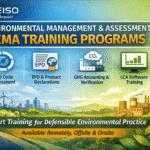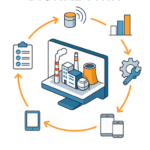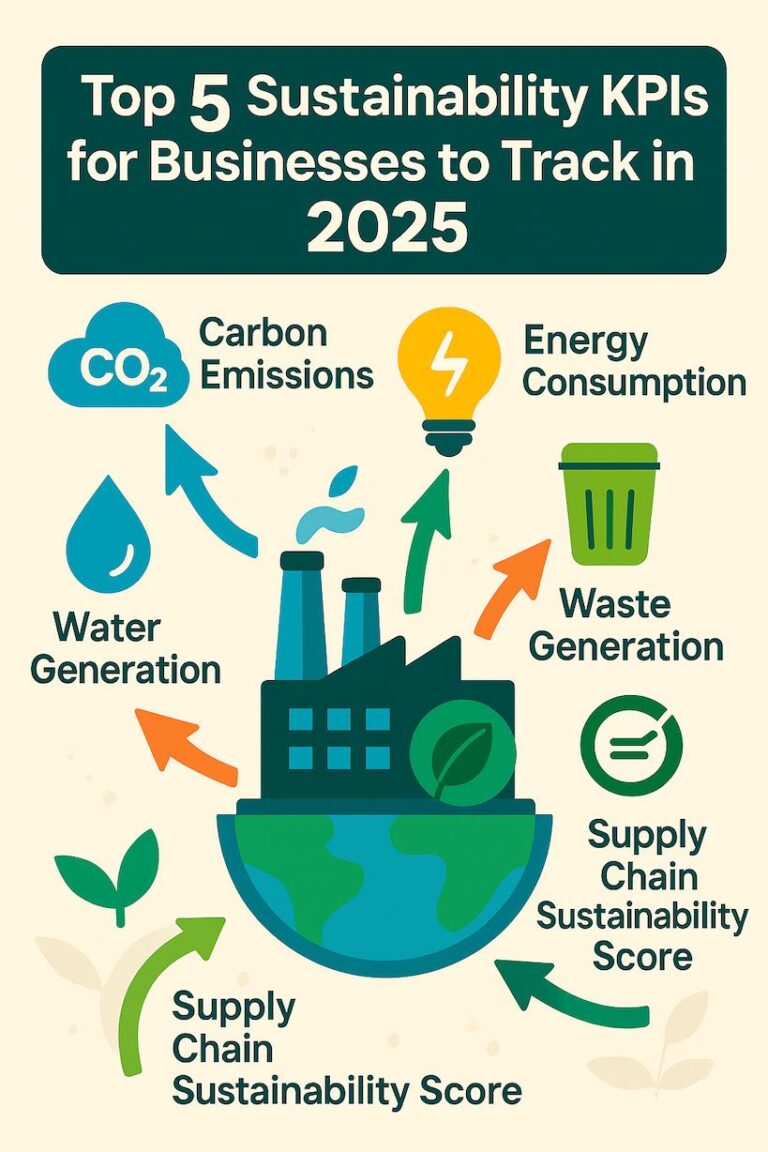
Section 1: Introduction – The Dawn of Sustainable Digital Transformation
The sustainability conversation has shifted. It’s no longer about whether businesses should act; it’s about how effectively they can measure and reduce their impact.
In 2025, that effectiveness comes down to data. No matter how ambitious a sustainability plan may be, without the right metrics in place, it’s little more than a good intention. This is why the smartest companies aren’t just pledging change; they’re tracking it.
But tracking environmental performance isn’t just about hitting compliance checkboxes anymore. It’s become a core part of operational excellence, reputation management, and even investor relations. Enter the world of sustainability KPIs for business—the measurable indicators that give companies clarity on their true environmental footprint.
From monitoring energy use in real time to understanding supply chain emissions, these KPIs help turn sustainability into strategy.
In this post, we’ll walk you through the Top 5 sustainability KPIs businesses should track in 2025—not just because they’re trending but because they’re transformational. We’ll break down what they mean, why they matter more than ever, and how solutions like DEISO’s AI-powered dashboards and consulting services can help turn these numbers into actionable impact.
Ready to measure what truly matters? Let’s get started.
Section 2: What Are Sustainability KPIs and Why Do They Matter
It has a clear, human-written, strategic tone. It introduces the concept, emphasizes relevance, and sets up the rest of the article.
If you can’t manage it, you can’t improve it. This simple idea lies at the heart of why sustainability KPIs for business matter more than ever in 2025.
KPI stands for Key Performance Indicator, and in the sustainability space, it refers to a specific, measurable metric that measures a company’s environmental performance over time. Think of them as your compass—pointing your organization in the right direction, even when goals shift or market pressures increase.
But here’s the key: not all sustainability KPIs are created equal.
Some metrics—like water usage or waste generation—are relatively straightforward to track. Others, like Scope 3 carbon emissions or supplier sustainability scores, require deeper integration and data collaboration across systems and partners.
Still, companies that make the effort to track these KPIs consistently are the ones reaping the benefits:
They’re more compliant with global ESG frameworks and regulations.
They attract environmentally conscious investors and clients.
They gain operational efficiencies that reduce both impact and costs.
And crucially, they can defend their sustainability claims with credible, real-time data.
This is where DEISO steps in. With custom-built sustainability dashboards, smart metric-tracking tools, and AI-enhanced insights, DEISO helps businesses track KPIs and turn them into real results.
In this section, we’ll explore the five KPIs that truly matter25, why they’ve risen to the top, and what makes them essential for modern businesses aiming to lead, not follow, on sustainability.
Section 3: The 5 Sustainability KPIs That Drive Business in 2025
Each KPI is deeply justified with examples, business relevance, and DEISO alignment. The summary table is included in two formats.
1. Carbon Emissions – Scope 1, 2, and 3
What It Measures:
Greenhouse gas emissions from direct operations (Scope 1), purchased energy (Scope 2), and value chain activities (Scope 3).
Why It Matters in 2025:
Carbon is no longer just an ESG talking point—it’s a business risk. With regulations tightening globally and carbon pricing schemes expanding, businesses are under pressure to quantify and reduce their full emissions profile. Investors, clients, and even procurement teams are demanding proof of decarbonization, and Scope 3 (often 70 %+ of a company’s total footprint) can no longer be ignored.
Real Example:
In 2023, major retailers like Walmart and Unilever began requiring carbon data from suppliers. By 2025, this will be the norm, not the exception. DEISO’s Role:
DEISO provides carbon accounting tools, dashboards, and supplier emissions mapping, helping companies get a clear, continuous view of all three scopes.
2. Energy Consumption (kWh or MJ per Product, Site, or Unit of Output)
What It Measures:
Total energy used — across facilities, equipment, processes — normalized per unit, site, or product.
Why It Matters in 2025:
With volatile energy prices and decarbonization goals, tracking consumption at a granular level is key to cost control and emissions reduction. High energy intensity signals operational inefficiency and is often the low-hanging fruit for sustainability gains.
Real Example:
A manufacturer optimizing line performance by tracking kilowatt-hours per product was able to reduce both emissions and utility bills by 17% in under six months. DEISO’s Role:
Through its IoT-ready platforms, DEISO enables real-time energy monitoring and predictive analysis to highlight abnormal usage trends or areas of waste.
3. Water Usage (m³ per Process or Product)
What It Measures:
Volume of water withdrawn, consumed, or discharged across processes, sites, or product lines.
Why It Matters in 2025:
Water risk is rising globally. Droughts and local water regulations are turning water into a material business issue from Asia to Africa to the American Southwest. Investors like CDP now demand corporate water disclosures, and efficiency is a competitive advantage in water-intensive sectors.
Real Example:
A beverage company in India saved over 30 million liters of water annually by identifying high-consumption process steps using KPI dashboard. DEISO’s platforms support water intensity tracking, integrate geographic water stress data, and help simulate water-saving scenarios using digital twins.
4. Waste Generation (kg or Tonnes per Site, Product, or Operation)
What It Measures:
Total waste generated — including hazardous, recyclable, and landfill — by location, operation, or product.
Why It Matters in 2025:
Waste is a cost center, an environmental liability, and a brand risk. Regulators and consumers are pushing for zero-waste operations and circular practices. Monitoring waste by stream type enables better material management and identifies reuse/recycling opportunities.
Real Example:
A European electronics brand achieved a 45% reduction in landfill waste by tracking site-level data and embedding circularity KPIs into operation. DEISO’s waste KPI modules break down waste types and track progress toward diversion and reduction goals, integrating AI insights for waste stream optimization.
5. Supply Chain Sustainability Score
What It Measures:
A composite score or benchmark of supplier environmental performance — energy use, emissions, labor practices, certifications, etc.
Why It Matters in 2025:
Most environmental impacts lie upstream. Brands are being held responsible for what their suppliers do. Pressure from ESG frameworks and client expectations means Procuremeca can no longer ignore sustainability.
Real Example:
Apple, Microsoft, and IKEA are investing millions to decarbonize their supply chains—not just their operations—because that’s where 80 %+ of their footprint lies. DEISO’s Role: With WiDEISO’s supplier scoring tools and Scope 3 visual dashboards, businesses can evaluate, monitor, and engage with suppliers for continuous improvements.
📄 Text-Based Summary Table
| KPI | What It Measures | Why It Matters in 2025 | DEISO Support |
|---|---|---|---|
| Carbon Emissions (Scopes 1–3) | GHG from operations, energy, and value chain | Regulatory compliance, Scope 3 pressure, ESG requirements | Carbon dashboards, Scope 3 visualizers |
| Energy Consumption | Energy used per site/product/process | Efficiency, cost savings, decarbonization | IoT energy tracking + predictive analytics |
| Water Usage | Withdrawn, consumed, discharged water | Water risk management, investor expectations | Water metrics, stress mapping, scenario modeling |
| Waste Generation | Total waste by category and location | Circularity, regulatory pressure, material recovery opportunities | Waste stream breakdowns, AI reduction paths |
| Supply Chain Sustainability Score | Supplier environmental/social performance | Scope 3 visibility, procurement strategy, investor scrutiny | Tiered supplier scoring, dashboard integration |
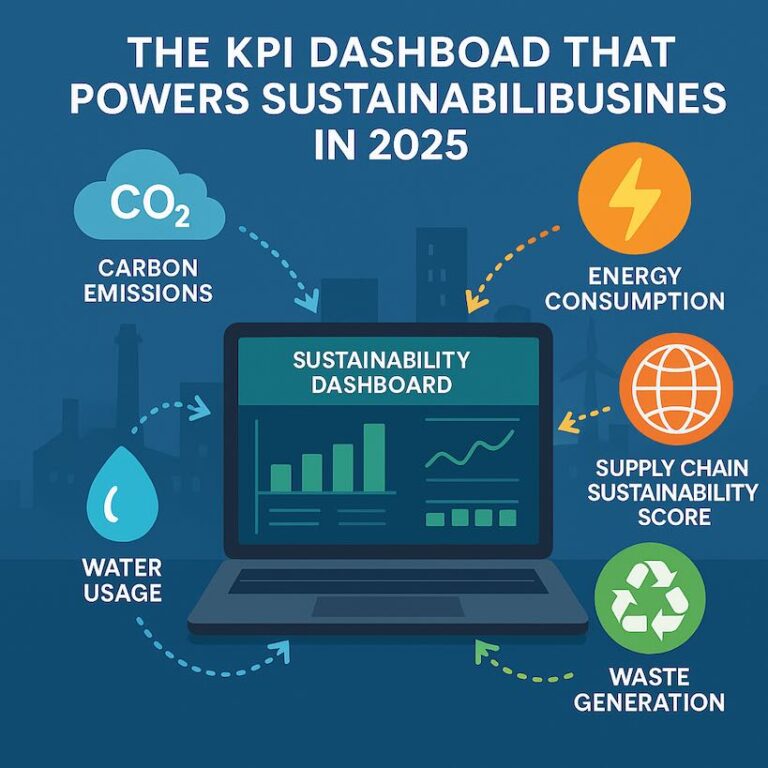
Section 4: How to Use These KPIs Strategically to Improve Performance
Practical, insight-driven, and tied to DEISO’s consulting and AI-driven services.
🔔 Visualization is required for this section. Please instruct me if you’d like a visualization concept generated after reading.
Tracking KPIs is a strong first step — but it’s what businesses do with that data that unlocks true value.
Companies often collect environmental metrics without connecting them to performance or decision-making. That’s where strategy comes in. The five KPIs outlined earlier are not just checkboxes for ESG reports—if used correctly, they’re levers for transformation.
Here’s how forward-thinking businesses are making sustainability KPIs work for them:
1. Set Contextual Benchmarks — Not Generic Goals
Don’t just aim to “reduce carbon emissions.” Instead, set targets based on baseline performance, industry standards, and location-specific variables.
→ DEISO’s consultancy team helps businesses contextualize KPI targets using sectoral benchmarks, climate policies, and internal baselines.
2. Use Real-Time Dashboards for Proactive Decision-Making
Static spreadsheets are outdated. Companies are shifting to live dashboards that visualize metrics in real-time, enabling instant response when a threshold is exceeded.
→ DEISO’s AI-powered dashboards allow users to track KPIs like energy spikes, waste anomalies, or water inefficiencies the moment they occur.
3. Simulate “What-If” Scenarios Using Digital Twins
Want to test how switching suppliers might reduce Scope 3 emissions? Or how a new production method might affect energy use?
Scenario modeling allows businesses to forecast the impact before acting.
→ DEISO’s digital twin platforms help simulate environmental outcomes for smarter decisions.
4. Translate Data into Department-Level Action
Make KPIs relevant to individual teams:
Operations → Energy intensity
Procurement → Supply chain score
Facilities → Water & waste metrics
→ DEISO offers tailored training for each business unit, making data actionable and aligned with operational goals.
5. Integrate KPI Reporting into ESG Narratives
Today’s stakeholders want both transparency and storytelling. A company that can tie its sustainability KPIs to its core mission will win trust.
→ DEISO supports ESG reporting by embedding KPI performance into compelling visual reports that connect with stakeholders.
The key takeaway? Don’t just track KPIs — turn them into strategy.
With the right tools, partners, and mindset, these five indicators can guide everything from process design to procurement decisions, creating a sustainability program that’s not just compliant but competitive.
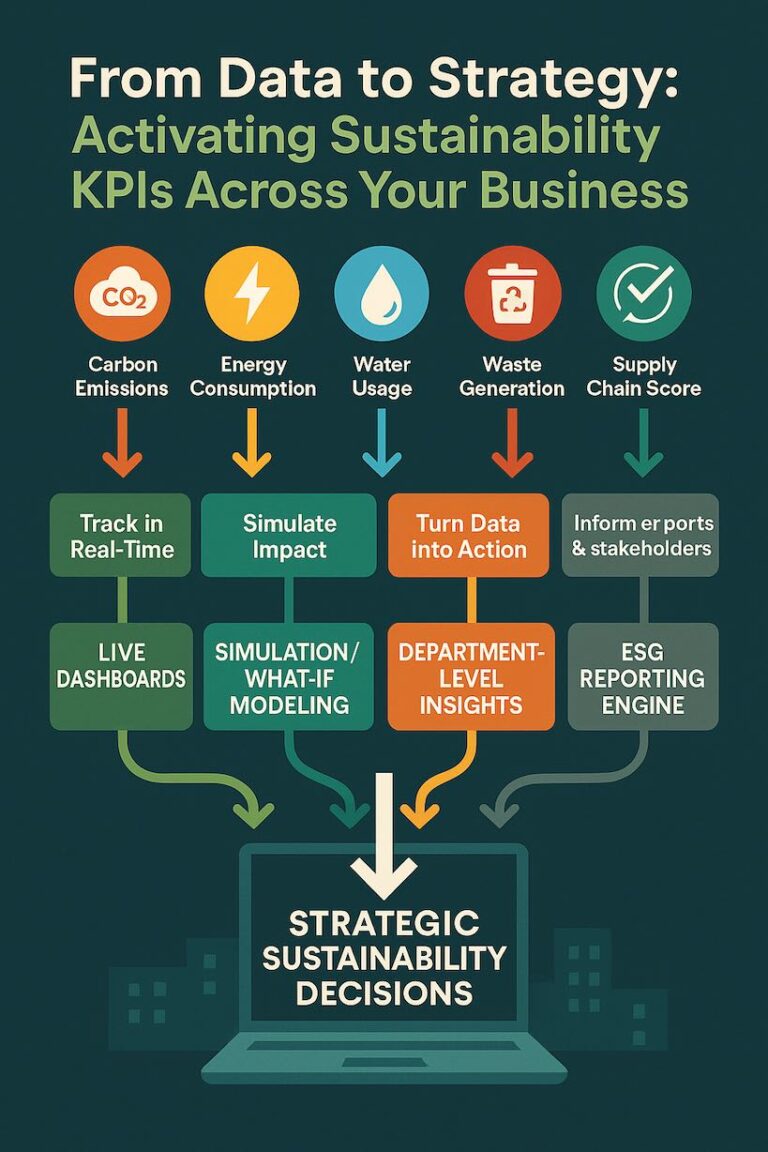
5: DEISO’s Approach – Turning KPIs Into Actionable Sustainability Insights
Focuses on DEISO’s core value proposition: consulting, digital products, AI tools, and training.
At DEISO, we believe that sustainability KPIs are only as powerful as the action they inspire.
While many companies struggle to move from data collection to real performance gains, DEISO bridges that gap by providing a complete ecosystem of sustainability services, digital tools, and expert guidance. Our approach is designed to make tracking, interpreting, and acting on environmental KPIs effortless and scalable.
Here’s how we help businesses make the most of their sustainability data:
🔧 1. Consultancy That Starts With the Right Metrics
Every business is different — which is why we begin with a tailored KPI strategy. Our sustainability consultants work closely with your team to:
Identify material environmental impacts
Align KPIs with your ESG goals
Ensure compatibility with frameworks like GRI, CDP, TCFD, or SBTi
This ensures you’re tracking the right things — not just popular things.
🖥️ 2. AI-Powered Dashboards and Digital Twins
Our digital platforms offer:
Live dashboards that track emissions, water, energy, and waste in real time
Automated Scope 1, 2, and 3 visualizers
Scenario simulation tools powered by digital twins
You see exactly where performance is lagging — and where you can improve.
📊 3. Smart KPI Reporting for ESG and Stakeholders
Our platforms transform raw metrics into intuitive reports and visualizations that help:
Communicate progress to executives and investors
Meet ESG disclosure requirements
Share real-time impact with customers or partners
🎓 4. Premium Training Programs for Every Team
Technology is only as powerful as the people using it. That’s why DEISO offers premium training programs covering:
Understanding and managing sustainability KPIs
Using dashboards for decision-making
Embedding KPI literacy across departments
Our training equips your teams to turn sustainability from a reporting task into a core business advantage.
Whether you’re just starting your sustainability journey or looking to scale your existing impact, DEISO brings strategy, technology, and expertise under one roof.
Our goal? To help you measure what matters — and act on it faster, smarter, and with confidence.
6: Overcoming Challenges and the Road Ahead
Addresses realistic concerns, DEISO’s role in solving them, and a forward-looking close.
While the benefits of sustainability KPIs are clear, the journey to effective tracking and performance improvement isn’t always simple. Companies often face barriers — some technical, some organizational, and some strategic. But these aren’t roadblocks. With the right support, they become stepping stones.
Here are some of the common challenges we see in 2025 — and how they’re being addressed:
⚠️ Challenge 1: Data Overload, But Insight Scarcity
Many organizations gather sustainability data… but don’t know what to do with it. It’s scattered across spreadsheets, disconnected systems, and siloed departments.
DEISO’s Solution:
We integrate your data sources into a centralized, intelligent dashboard, turning complexity into clarity. With real-time visibility, your teams can confidently prioritize, act, and measure
⚙️ Challenge 2: Lack of Internal Expertise
Sustainability isn’t just a technical issue — it’s a knowledge challenge. Many businesses lack the in-house expertise to interpret sustainability metrics or build KPI strategies aligned with ESG goals.
DEISO’s Solution:
Our consultants and training programs fill this gap, offering strategic guidance and hands-on skill-building tailored to your team’s role.
💰 Challenge 3: Cost and ROI Uncertainty
Leadership often asks: “Will investing in this tracking system or platform pay off?”
DEISO’s Solution:
Our systems are designed to deliver ROI through efficiency gains, risk reduction, and brand value. We help you quantify benefits — from reduced waste disposal costs to avoided regulatory penalties — making sustainability not just the right thing to do, but the smart thing.
🤖 Challenge 4: Keeping Up With Evolving Standards
Sustainability regulations and ESG frameworks are evolving rapidly. What’s compliant today may be insufficient tomorrow.
DEISO’s Solution:
We monitor global ESG trends and evolving disclosure frameworks. Our solutions are modular and future-proof, so your tracking and reporting systems can evolve with the times.
🚀 Looking Ahead
The future of sustainability reporting isn’t just digital — it’s real-time, predictive, and proactive. As AI, IoT, and automation mature, sustainability KPIs will become central to day-to-day operations, not just annual reports.
And DEISO will lead the way, helping businesses turn environmental intelligence into smart, scalable decisions.
Section 7: Conclusion – Your Next Step Toward Data-Driven Sustainability
Final recap, emotional reinforcement, DEISO’s value, and a clear CTA.
🔔 Visualization Required: Final visual summary to follow this section.
Sustainability isn’t a destination — it’s a discipline. And in 2025, that discipline is built on data you can trust, interpret, and act upon.
We’ve explored the five sustainability KPIs that aren’t just trending — they’re transforming the way businesses operate, report, and grow:
-
From carbon to waste, these metrics reveal what’s working — and what’s not.
-
They give you visibility into risk, efficiency, and opportunity.
-
And when integrated into your daily operations, they help you lead in a world where environmental performance is no longer optional.
But here’s the truth: even the best KPIs are meaningless without action.
That’s where DEISO comes in. Whether it’s our AI-powered dashboards, digital twin simulations, Scope 3 analytics, or training programs, we turn those numbers into momentum.
We help you see clearly, act confidently, and build smarter strategies — not just for compliance, but for competitive advantage.
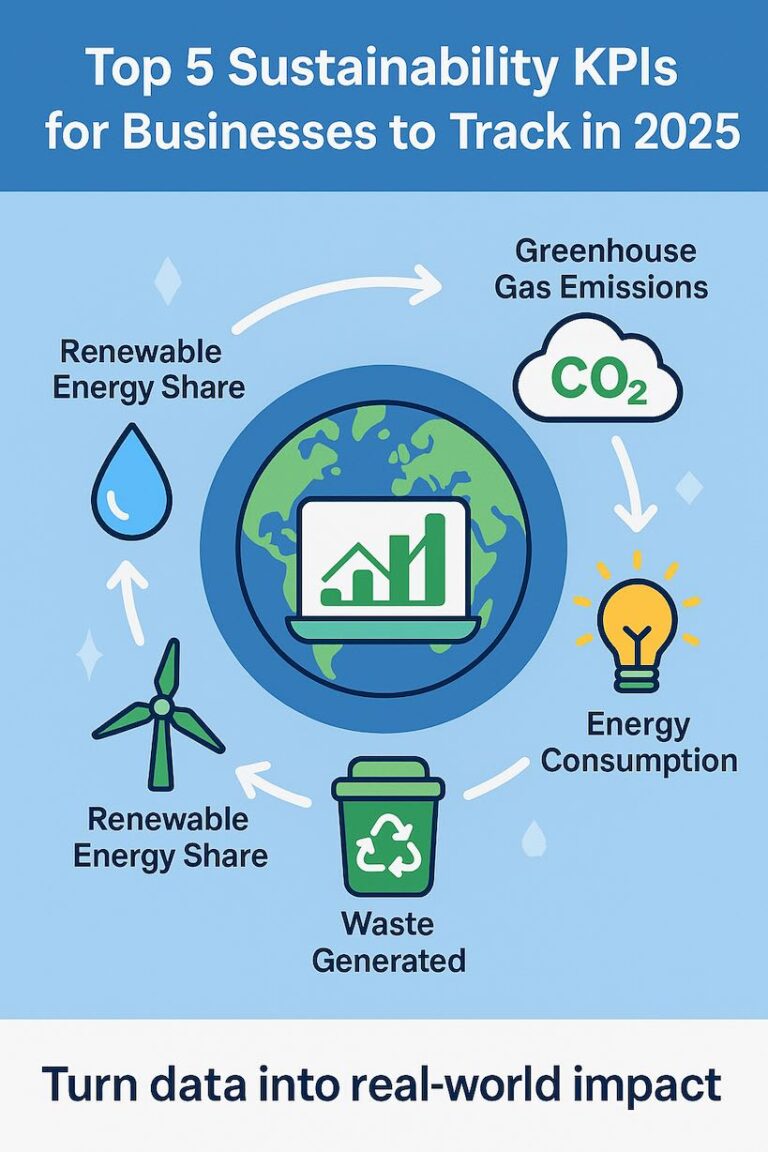
📣 Call to Action:
Are you ready to measure what truly matters?
👉 Contact DEISO today to schedule a consultation and discover how our KPI solutions can elevate your environmental performance.
Let’s turn your sustainability goals into measurable, real-world impact.
Share this:
- Email a link to a friend (Opens in new window) Email
- Share on LinkedIn (Opens in new window) LinkedIn
- Share on X (Opens in new window) X
- Share on Facebook (Opens in new window) Facebook
- Share on WhatsApp (Opens in new window) WhatsApp
- Share on Reddit (Opens in new window) Reddit
- Print (Opens in new window) Print
- More

